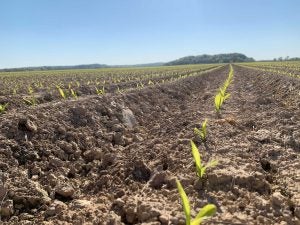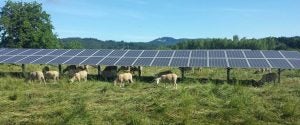There are many systems to get producers, processors, and retail to “go green.” Many farmers used to take part in carbon credits, but now we are seeing a shift to a “net zero” system.
As a college student, I hear the term “net zero” a lot — it refers to net-zero carbon dioxide emissions.
When my parents were in school, they were taught how to grow better crops and bigger cows. Now here I am, hoping to learn how to make the crops better and the cows more productive — but I’m told to slow down.
My professors tell us that the money is no longer in the product itself, rather it is in what goes on behind the scenes. Are the cows happy? Are my tractors fuel efficient? What do I do to minimize nutrient run-off? Farmers can answer these questions, but how do we spread awareness of those answers to each and every consumer who picks up a gallon of milk, a package of hamburgers, or a bag of apples?
The answer to that is an industry standard. Just as a farm has to meet certain qualifications to be considered organic, or eggs have to be classified on weight and quality for their letter grade, we can come up with a system that labels a farm as sustainable.
Net zero is like a carry-in-carry-out park: You bring the trash in, you take the trash out. The trash here would be greenhouse gasses such as carbon dioxide and methane. Animals and crops cannot be grown without releasing greenhouse gasses into the air; what a net zero system does is make sure that every farmer is offsetting their emissions.

It is easy to think about all the ways we emit greenhouse gasses, but it’s hard to think about how farmers contribute to cleaning the air. According to Michigan State University, an acre of corn can absorb 18 tons of carbon dioxide simply by growing. On average, a farm uses about seven gallons of diesel per acre, and that translates to about 161 pounds of carbon dioxide per acre, according to the U.S. Energy Information Agency. So, by planting an acre of corn, we are bringing 161 pounds of carbon dioxide with us, but are taking out eight tons.
Net zero doesn’t sound as scary now, eh?
Different industries are starting to favor practices to make them more sustainable. Going cold turkey on tilling your fields does not make you lazy, it puts you with a growing number of crop farmers who realize the benefits that no till has to offer. Along with the benefits reaped by the soil and microbiome, no tilling means less fuel used.
Farmers with livestock are opting in to anaerobic digesters, which houses manure and harvests methane. Anaerobic digesters are a double whammy because they prevent the methane from going into the atmosphere, plus that methane is used as a renewable energy source.
Many fruit and vegetable farms have growing community supported agriculture (CSA) programs, which have many benefits. By getting the community on the farm, farmers are cultivating interest and awareness in agriculture. Plus CSA programs reduce food waste and the miles that are put on food between farm and table.
Farmers are already moving toward more sustainable practices because sustainability is clean and cost effective. But the future holds more.

Solar panels are growing more and more popular, and farmers of small livestock are starting to take advantage of them. Solar panels can be used both to harvest solar power and create shaded areas for grazing sheep and goats. Some day I expect that nearly every farm will have solar panels.
Progress is also being made every day to make tractors and large trucks more efficient. Did you know that many city busses now are electric? A bus used to tote people around in the city has close to 300 horsepower, and there are many widely used tractors that are at or below 300 horsepower.
In the future we might see nearly every large livestock farm with an anaerobic digester, and we will surely see new GMO crop varieties made to consume more carbon dioxide than before.
Net zero would be joining the packaging as another label. But it would show consumers that farmers really mean it when we say we are stewards of the land.
Farmers can’t produce a high-quality product with low quality work. Achieving net zero would just add to the pride we can take in our products and allow future generations a cleaner and greener world.
Elizabeth Maslyn is a Cornell University student pursuing a career in the dairy industry. Her passion for agriculture has driven her desire to learn more, and let the voices of our farmers be heard.



